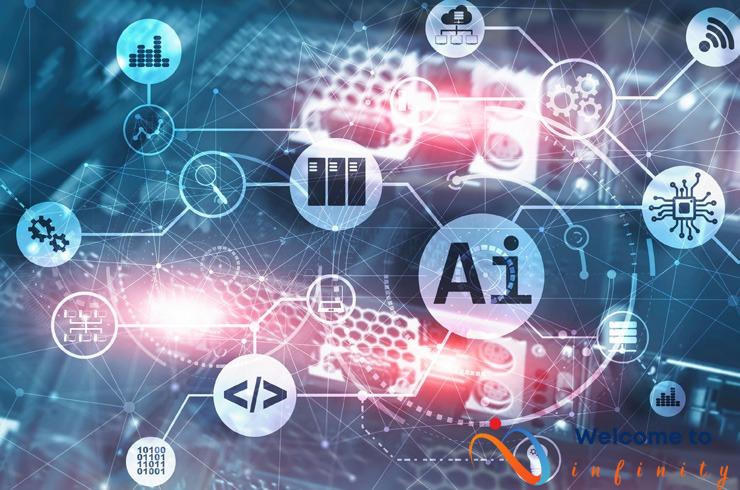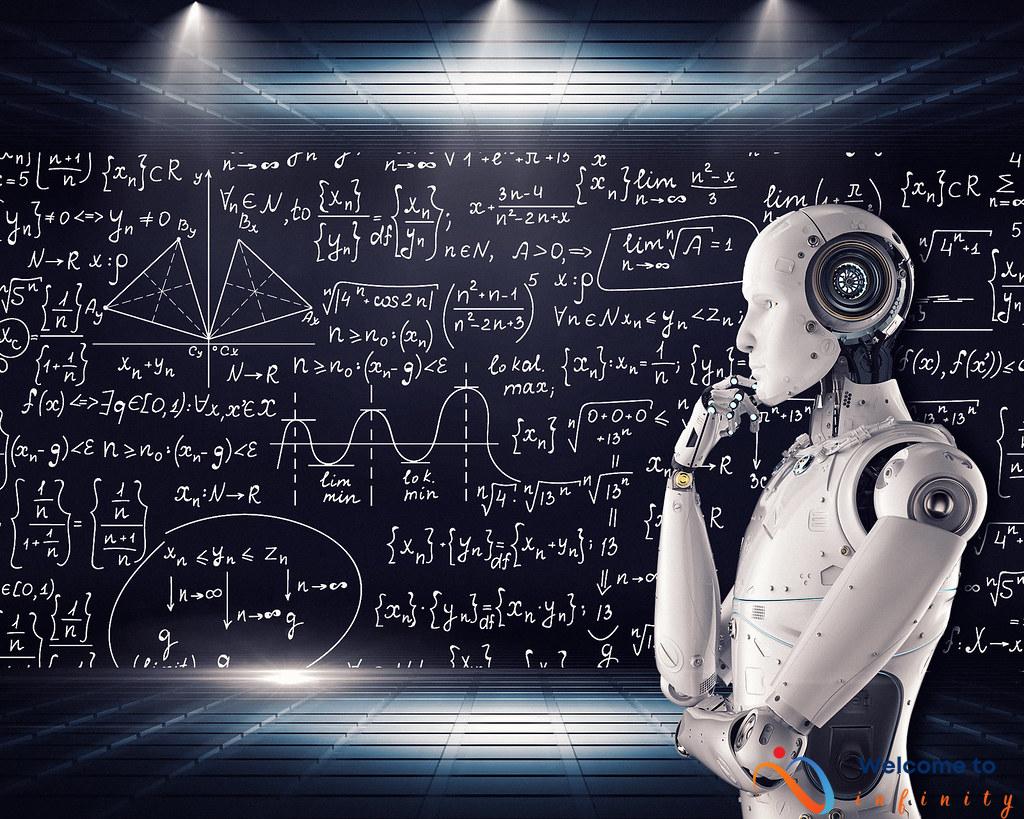With each passing day, technology continues to revolutionize different industries, and the agricultural sector has not been left behind. One of the most significant advancements that have taken place in recent times is the introduction of Artificial intelligence (AI) in modern farming. AI-powered smart farming techniques and crop monitoring systems have proven to be a game-changer in the industry, offering benefits such as increased productivity, reduced costs, and improved overall efficiency.
The introduction of smart technology and sensors in agriculture has enabled farmers to make better decisions, optimize land management techniques, and improve outcomes. The use of AI applications such as crop prediction, precision farming, and livestock farming has provided optimal results in crop yields and reduced waste. Using AI-powered techniques such as variable rate fertilization and irrigation, optimal planting times, and plant selection has increased plant health, leading to improved yields.
Incorporating AI in crop prediction has enabled farmers to analyze satellite and weather data to provide predictions about crop yields. This has translated to intelligent planting techniques and efficient handling of resources, reducing waste and optimizing crop growth. Additionally, AI has been useful in livestock farming, providing farmers with real-time monitoring tools for animal health and behavior, enabling them to make better breeding and disease prevention decisions.
While there are challenges in adopting AI in agriculture, such as ethical considerations and scalability, the benefits far outweigh the limitations. AI-powered precision farming, crop prediction, and livestock monitoring techniques offer tremendous potential to improve productivity and efficiency. The introduction of AI in agriculture has the potential to revolutionize the food production industry by supporting sustainable solutions, ensuring food security, and reducing the impact of human activities on the environment.
Smart Farming
Smart farming is a unique approach to agriculture that employs the use of sensors, IoT devices, and AI technologies to manage and optimize farming processes. These technologies enable farmers to make better decisions about their crops, land management practices, and farming methods. In smart farming, an array of sensors monitors plant health, soil moisture, and other environmental factors in real-time, providing accurate data to farmers. Through machine learning, AI algorithms analyze the data collected by these sensors to provide automated recommendations for the farmer.
Moreover, smart farming technologies have revolutionized crop monitoring, allowing farmers to identify and address issues before they escalate. For instance, drone technology equipped with specialized cameras can help farmers detect plant diseases and pests with accuracy. These technologies can also evaluate crop yields and growth rates, and recommend strategic changes to improve overall efficiency.
In addition to these automated processes, smart farming allows farmers to monitor their agricultural setup remotely, giving them the flexibility to monitor their crops from anywhere. Smart irrigation systems can automatically reduce or increase the amount of water delivered to the crops based on soil moisture levels in real-time, thus optimizing water usage. Smart fertilization systems also employ similar technology where they can apply the right amount of fertilizers at the right time, resulting in a reduction in resource wastage and environmental pollution.
Overall, smart farming presents an innovative solution to the challenges facing modern agriculture. By utilizing smart technology and AI-enabled techniques to optimize farming processes, farmers can achieve better resource usage, higher yield, and more profitable harvests.
AI Applications in Agriculture
Artificial Intelligence (AI) has been a game-changer in agriculture. It has revolutionized the use of technology in farming practices and brought about new and advanced methods of crop monitoring. AI is used in different aspects of agriculture, including crop prediction, precision farming, and livestock farming. With the use of AI technology in agriculture, farmers can optimize their production practices, improve yields, and reduce costs.
In crop prediction, satellite and weather data are analyzed to predict crop yield and health. By analyzing data, AI-powered models can determine optimal planting times, suggest the best crop varieties for specific soils, and calculate nutrient requirements for the soil. Additionally, agricultural drones equipped with AI technology can monitor crop health and detect anomalies, such as water stress, nutrient deficiency, or pest damage in crops.
Precision farming is another area that has seen tremendous benefits from AI. By using AI-powered techniques like plant selection, variable rate fertilization, and irrigation, precision farming allows for optimal use of resources like water and fertilizer. Farmers can quickly analyze soil data and prescribe the correct amount of nutrients required for their crops. Furthermore, AI-powered tools can be used to identify areas in fields where crops aren't growing well and notify the farmer to correct the problem.
Livestock farming is another area where AI technology is finding use. AI-powered cameras, sensors, and machines can monitor livestock health and behavior patterns, enabling farmers to identify any sick animals. Additionally, AI technology can be used to monitor animal feed consumption, milk production, and reproductive health, which can help farmers optimize their breeding practices.
In conclusion, the application of AI technology in agriculture has brought great benefits to farmers in different aspects of farming practices. From crop prediction to precision farming and livestock farming, AI is helping farmers improve their yields and reduce costs. As AI technology advances, it is expected to have a more significant impact on agriculture, making farming practices more efficient and sustainable.
Precision Farming
Precision farming, also known as site-specific crop management, is a vital application of AI in agriculture. It employs AI-powered techniques to analyze data collected from geospatial sensors, satellite images, and weather forecasts for optimal farming operations. The data collected is used to determine the ideal planting time, determine the required soil nutrients and fertilizers, and manage irrigation on a variable rate based on weather patterns.
The various applications of Precision farming include plant selection, crop rotation, and soil analysis. AI techniques help farmers to select crops that are suitable for their area and have the best chance of growing successfully. It also simplifies the process of crop rotation, as AI can analyze data such as soil moisture levels and nutrient content to determine the best rotation period for each crop.
One of the essential aspects of precision farming is the ability to manage resources effectively. By accurately determining the precise amount of fertilizer and water needed on a crop-by-crop basis through AI analyses, farmers can optimize resource use, minimize waste, and reduce the cost associated with overusing fertilizers. This streamlined use of resources ensures maximum yield and minimizes the impact on the environment.
Another crucial aspect of precision farming is plant disease detection. AI techniques can detect signs of pests and diseases early on and develop a suitable intervention strategy before significant harm is done to the crops. Farmers can then take preventative measures such as crop rotation, targeted pesticide application, or improved irrigation practices to reduce crop losses and increase yield.
In conclusion, precision farming is revolutionizing the agricultural industry by using AI to optimize farming operations to increase yields, minimize waste, and reduce the impact of agriculture on the environment. When coupled with the use of geospatial sensors and satellite images, precision farming techniques provide a comprehensive platform for farmers to make informed decisions and maximize their profits while caring for the environment.
Crop Prediction
Crop prediction is an important aspect of agriculture, and AI has made this task much more efficient and effective. AI-powered prediction models can analyze satellite and weather data to predict crop yield and health accurately. This technology enables farmers to optimize their crop management practices and make better decisions that save time, resources and money. AI algorithms can analyze massive amounts of data in real-time and provide actionable insights to farmers.
The AI prediction models can analyze data on temperature, humidity, rainfall, and other climate factors, along with satellite images to predict the health and yield of crops accurately. Farmers also have access to historic data from previous growing seasons, which they can use to inform and refine their farming practices. By predicting crop growth, farmers can schedule harvesting times, plan irrigation and fertilization schedules, and take necessary measures in the event of potential crop damage due to weather or pests.
AI technology in predicting crop growth can also help in reducing market risks to farmers. With AI-generated market predictions, farmers can make informed decisions about when to sell their crops based on market demand. This can prevent farmers from being left with unsold produce and potential revenue loss.
In conclusion, AI-powered crop prediction models are revolutionizing agriculture to transform crop monitoring and management globally. The technology has the potential to help farmers maximize yields, reduce resource waste, and also provide greater food security. AI is rapidly taking over mundane tasks, allowing farmers to concentrate on providing top quality, sustainable produce.
Animal Monitoring
Animal monitoring is an important aspect of livestock farming, and AI technology is making it easier and more efficient. With sophisticated sensors and algorithms, AI can track animal movements, eating habits, and other behaviors to monitor their health and wellbeing.
Through animal monitoring, farmers can identify which animals are in heat, have health issues, or require treatment. AI can also analyze the data to predict when a cow will give birth and alert farmers to any potential complications. This helps farmers make informed decisions about breeding and reduces the risk of disease outbreaks.
Using AI for animal monitoring also means that farmers can reduce their use of antibiotics and other medications. By identifying health issues early, farmers can treat animals with precision and avoid unnecessary treatments that can harm the environment.
Overall, AI-powered animal monitoring helps farmers to optimize breeding and disease prevention practices. This not only leads to healthier animals and higher-quality products but also helps to reduce waste and improve sustainability in livestock farming.
Challenges and Opportunities
While AI has great potential to revolutionize agriculture, it is not without its challenges. One of the biggest concerns is the ethical implications of using advanced technology in farming practices. There are concerns that the use of AI could potentially lead to the loss of jobs for human workers, as machines become increasingly capable of performing tasks that were previously only done manually.
Cost is another major concern when it comes to implementing AI in agriculture. Many smaller farms may not have the resources to invest in these technologies, and may be left behind by larger, more well-funded operations. Furthermore, the cost of maintaining and repairing these systems can be steep, and may put additional financial strain on already struggling farms.
Scalability is also an important consideration when it comes to AI in agriculture. While the technology may work well for large-scale farming operations, it may be more difficult to apply in smaller, more diverse settings. Additionally, the regulations and policies surrounding AI in agriculture are still evolving, and may create barriers to implementation in certain regions or markets.
However, despite these challenges, there are many opportunities for AI and advanced technology to revolutionize agriculture for the better. With the ability to more accurately predict crop yields and monitor livestock health, farmers can make more informed decisions about land management and crop selection. Furthermore, these technologies can help to reduce waste and optimize farming practices for better sustainability and long-term success.
Overall, while there are certainly obstacles to implementing AI in agriculture, the potential benefits are significant. As technology continues to advance and become more accessible, it is likely that we will see more and more farms embracing these tools and reaping the rewards of a more efficient, sustainable approach to farming.
Limitations of AI in Agriculture
Despite the numerous benefits that AI technology brings to the agriculture industry, there are also several potential limitations to consider. One of the primary concerns is data accuracy. While AI algorithms can analyze vast amounts of data, if the data itself is inaccurate or incomplete, the algorithms may produce incorrect results. This can lead to misinformed decisions about crop management and potentially harm the agricultural production.
Another limitation is ethical considerations. Farmers should be aware of unauthorized data use, cybersecurity risks and ethical concerns regarding the use of the AI technology. In addition to addressing data privacy concerns, it is important to monitor and regulate the impact of AI on the environment. In order for AI to be widely used in agriculture, farmers need to have trust in the technology and ensure that their decisions do not harm the environment or living beings.
The cost of implementing and maintaining AI technology in agriculture is also a concern. Small farmers may not have the financial resources to adopt these techniques, and farmers from developing countries may have difficulty accessing the necessary technology. With the increased use of AI in agriculture, there are also concerns around job displacement of traditional farmers who may not have the skills to use or manage AI-powered machinery.
To address these limitations, it is essential to invest in AI technology that is reliable, accurate and accessible to all farmers. Furthermore, there needs to be proper regulation and guidelines for AI usage in agriculture that protect data privacy, ensure ethical practices, and optimize productivity. While AI may not be a silver bullet for all of agriculture's problems, it still holds immense potential to improve production, reduce waste, and increase profitability for farmers around the world.
Opportunities for AI in Agriculture
AI in agriculture presents immense opportunities for farmers to improve their crop yields, reduce waste, and optimize their farming practices. By analyzing vast amounts of data, AI-powered machines can provide farmers with valuable insights into their fields. For instance, precision farming powered by AI can provide optimal planting schedules, fertilization, and irrigation by analyzing weather patterns and soil types. This helps reduce waste and optimize yields as farmers are able to tailor their planting and maintenance techniques to specific crops, soils, and weather conditions.
Moreover, AI-powered crop prediction models can analyze satellite and weather data to predict crop yield and health. This enables farmers to identify potential risks and plan accordingly, leading to better crop management and yields. In addition, AI technology is promising for livestock farming by monitoring their health and behavior for better breeding and disease prevention, leading to more healthy and sustainable practices.
Another significant advantage of AI technology in agriculture is reducing labor costs and improving efficiency. With the use of autonomous machinery, farmers can save on labor costs, reduce human error and increase productivity. In addition, predictive analytics can provide farmers with real-time information about the maintenance status of their machines and equipment reducing downtime and increasing efficiency.
Overall, the potential benefits of AI technology in agriculture are enormous. It can be a sustainable solution for food production and security and help to meet the increasing demand for food due to population growth. While there are challenges and limitations in implementing AI technology in agriculture, the opportunities outweigh the costs and challenges. The future of agriculture will be driven by AI-powered machines and systems that offer farmers real-time information and insights into their fields, leading to optimized yield and sustainable infrastructure.
The Future of AI in Agriculture
As technology continues to advance at an unprecedented pace, the future of agriculture looks promising with the use of Artificial Intelligence. AI has the potential to revolutionize farming practices by improving yields, reducing waste, and increasing food security for the growing population.
One of the major advantages of AI in agriculture is precision farming, which involves using AI-powered techniques for plant selection, optimal planting times, and variable rate fertilization and irrigation. This not only increases crop yields but also minimizes wastage and reduces input costs for farmers.
Furthermore, AI can be used in crop prediction, where prediction models analyze satellite and weather data to predict crop yield and health. This can help farmers plan their crops accordingly, including identifying areas where there may be a higher risk of crop failure or disease outbreaks.
AI can also be used for animal monitoring, which can help farmers to monitor the health and behavior of livestock. This can help farmers to identify potential health issues and make informed decisions about breeding and disease prevention.
However, there are also limitations to AI technology in agriculture, including data accuracy, ethical considerations, and cost. It is crucial that farmers have access to accurate and reliable data to make informed decisions and prevent potential harm to the environment.
Despite these challenges, AI has the potential to be a sustainable solution for food production and security. By optimizing farming practices and reducing waste, AI can help to feed a growing population while minimizing the impact on the environment. With further research and development, AI could play an instrumental role in securing the future of agriculture.
In the end, AI is an exciting opportunity for agriculture with great potential. But the technology must be developed and implemented carefully, taking into account all its limitations and ethical considerations, in order to ensure that it is truly sustainable and supports a better future for our planet.











